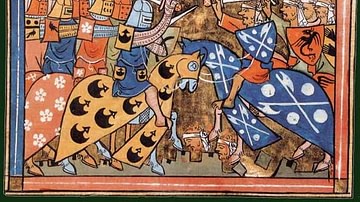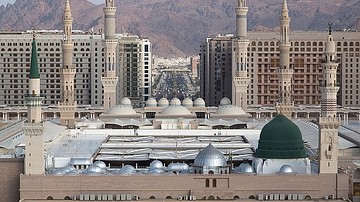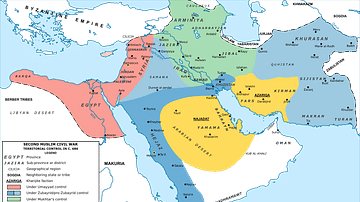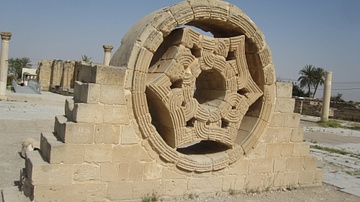Search
Search Results

Article
Zengids & the Crusaders: Race for Egypt (1163-1169 CE)
In the aftermath of the failure of the Second Crusade (1147-1149 CE), which only managed to bring Damascus under Nur ad-Din's (sometimes also given as Nur al-Din, l. 1118-1174 CE) dominion, Egypt acquired top priority – both from a strategic...

Interview
Interview with Simon from Lithodomos VR
In this interview, Ancient History Encyclopedia is talking to Simon Young, the founder of Lithodomos VR, which is a company based in Melbourne, about their new platform Ancient World! Simon (Lithodomos VR): Hi, Kelly. It is great to be here...

Video
Siege of Constantinople 717-718 CE - Arab-Byzantine Wars
The forces of the Rashidun Caliphate achieved a decisive victory against the Byzantines at Yarmouk in 636. This allowed the Muslims to take over Syria and Egypt. But the Eastern Roman Empire was still strong and continued its resistance...

Definition
Prophet Muhammad
Muhammad ibn Abdullah (l. 570-632 CE) is venerated today as the Prophet of Islam and the “seal of Prophets” by his followers – the Muslims. Muslims believe that Muhammad was the last – hence the “seal” – of many prophets before him in Judaism...

Image
Map of the Middle East during the Second Fitna (c. 686 CE)
A map depicting the divisions of the Islamic Empire during the second Islamic civil war - the Second Fitna. The dominions of the Umayyads, Zubayrids, Kharjites, Al Mukhtar and those regained by the Byzantines are shaded in colors as indicated...

Definition
Hisham's Palace
Hisham's Palace at Khirbat Al Mafjar (the ruins of Mafjar) is an Umayyad structure that is listed among the last of the surviving antiquities of Romans and Byzantines. It was built by Walid Ibn Yazid in 734 CE near Jericho in the Jordan Valley...

Video
Battle of al-Qadisiyyah 636 - Muslim-Sassanid War of 633-654 DOCUMENTARY
In one of our previous videos, we covered the battle of Yarmouk (https://youtu.be/5Ct4OSmdZ3M) between the Byzantine Empire and the Islamic Rashidun Caliphate. This battle largely defined the fate of Eastern Mediterranean, but to the East...

Image
Map of the Silk Road at Its Height in the Late 8th Century
This map illustrates the Silk Road in the late 8th century, a vast network connecting Tang China, Central Asia, the Islamic world, and Europe. More than just a silk route, it enabled the exchange of luxury goods, technologies, and religions...

Image
Map of Medieval North Africa, c. 1065 - From Desert Tribes to Kingdoms: Power Shifts in the Post-Caliphate Maghreb
This map illustrates the shifting geopolitical landscape of North Africa and the Western Mediterranean in 1065, a pivotal moment marked by fragmentation and the emergence of new powers. As older dynasties weakened, new forces rose across...

Image
Calligraphy of Abu Bakr
The vector version of the iconic calligraphy of the founder of the Rashidun Caliphate, Abu Bakr (c. 573 CE – 634 CE), which is prominent in the Hagia Sophia in Istanbul, Turkey.